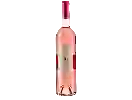
Château FontvertLe Mourre Rosé
This wine generally goes well with beef, lamb or mature and hard cheese.
Wine flavors and olphactive analysis
On the nose the Le Mourre Rosé of Château Fontvert in the region of Rhone Valley often reveals types of flavors of oak.
Food and wine pairings with Le Mourre Rosé
Pairings that work perfectly with Le Mourre Rosé
Original food and wine pairings with Le Mourre Rosé
The Le Mourre Rosé of Château Fontvert matches generally quite well with dishes of beef, lamb or spicy food such as recipes of pot-au-feu, lamb kleftiko (greek) or filet mignon with curry.
Details and technical informations about Château Fontvert's Le Mourre Rosé.
Discover the grape variety: Mourvèdre
Mourvèdre noir is a grape variety originating from Spain. It produces a variety of grape specially used for wine making. It is rare to find this grape to eat on our tables. This variety of grape is characterized by medium to large bunches, and grapes of medium size. Mourvèdre noir can be found in several vineyards: South-West, Cognac, Bordeaux, Provence & Corsica, Rhône valley, Languedoc & Roussillon, Loire valley, Savoie & Bugey, Beaujolais.
Last vintages of this wine
The best vintages of Le Mourre Rosé from Château Fontvert are 2018, 2017
Informations about the Château Fontvert
The Château Fontvert is one of of the world's greatest estates. It offers 24 wines for sale in the of Rhône méridional to come and discover on site or to buy online.
The wine region of Rhône méridional
Côtes du Rhône is a regional appellation in the Rhône Valley in eastern France. It applies to red, rosé and white wines, and includes more than 170 villages. The area follows the course of the Rhône southward for 125 miles (200 km) from Saint-Cyr-sur-le-Rhône to Avignon. A small portion of the wines in the appellation are white wines.
The wine region of Rhone Valley
The Rhone Valley is a key wine-producing region in Southeastern France. It follows the North-south course of the Rhône for nearly 240 km, from Lyon to the Rhône delta (Bouches-du-Rhône), near the Mediterranean coast. The Length of the valley means that Rhône wines are the product of a wide variety of soil types and mesoclimates. The viticultural areas of the region cover such a distance that there is a widely accepted division between its northern and southern parts.
The word of the wine: Gutedel
See chasselas.














